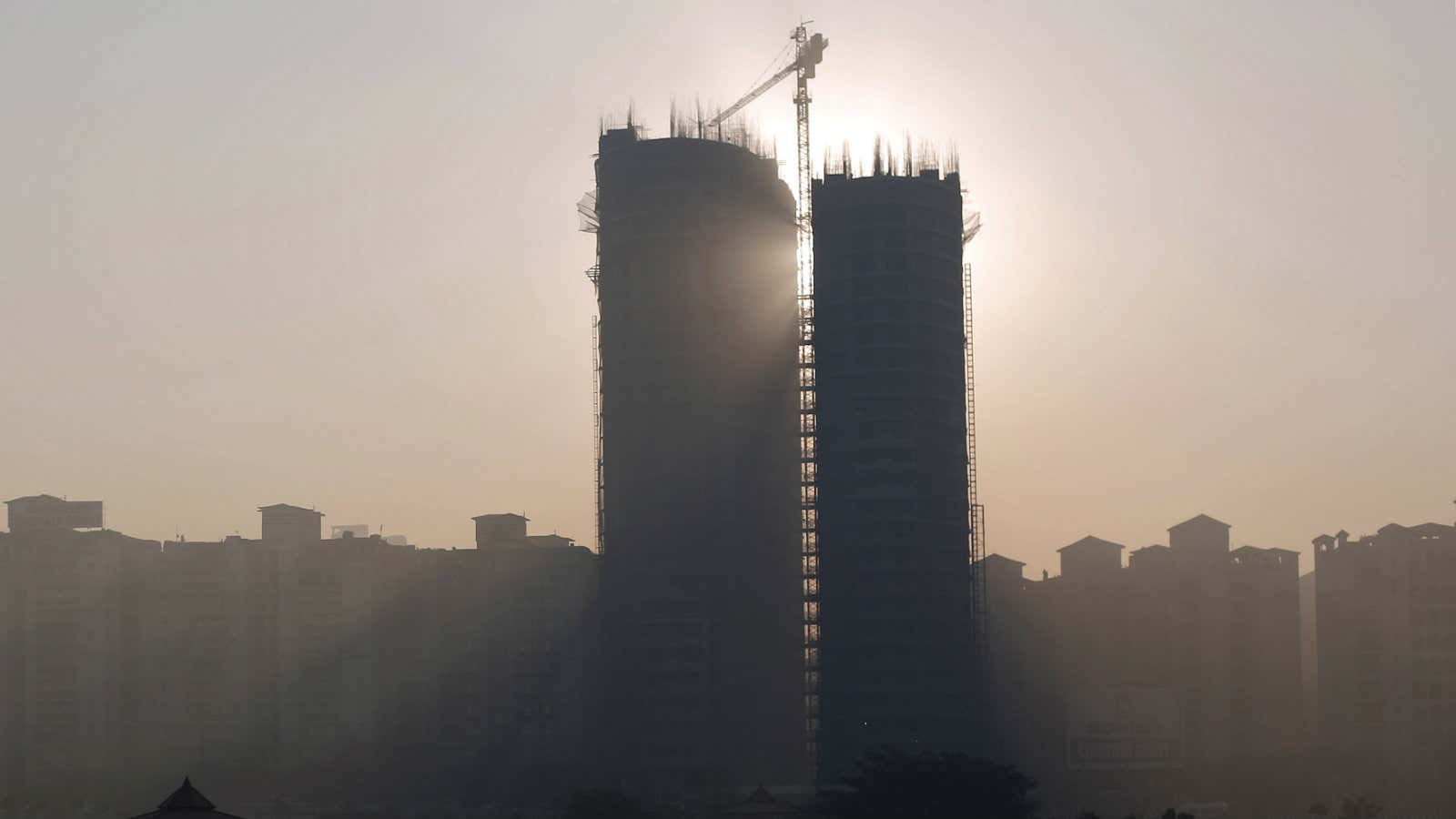The onset of the Indian summer this year may have one particular industry sweating more profusely than others even as its customers sigh in relief.
The upper house of Indian parliament, the Rajya Sabha, last week passed a bill that could fundamentally change the way business is done in the real estate sector. The Real Estate (Regulation & Development) Bill, 2015, will now be tabled in the Lok Sabha today (March 14). If it gets through, the proposed law will be sent for presidential assent.
Among other things, the bill envisages a desperately needed industry regulator and imposition of heavy fines on builders for delay in completion of housing projects. Not surprisingly, the news of the Rajya Sabha—where prime minister Narendra Modi-led National Democratic Alliance (NDA) lacks a majority—passing the bill was received warmly on social media, with people thanking both the opposition Congress and Modi’s party, the Bharatiya Janata Party.
Why a regulator?
In the absence of a tough regulator and unwillingness of the average middle class homebuyer to get into lengthy legal battles, most builders have for many years taken hapless customers for a ride. Delayed projects—sometimes by up to six years—and arbitrary changes in layout plans are rampant. So is the manipulation of the ratio between super built-up (stairs, lift, corridors etc.) and carpet areas (net usable area inside the house).
Poor construction quality or deviation from promised quality is common, too.
Builders frequently get away with delayed handing over of possession. This is often done on the sly by inserting important clauses in thick agreement contracts replete with legalese, which apartment buyers rarely bother to read.
Besides, diversion of money collected for one project to another, or towards speculation in land deals, jacks up land prices, making homes increasingly unaffordable.
Many builders just don’t have a provision of late possession penalties, though they would levy 15-18% extra on buyers who delay payments.
Given these harsh realities, the passage of the realty bill has set off alarm bells among unscrupulous builders. Hence, it is not surprising to see headlines such as ”Do you seek to regulate us, or choke us?” for articles capturing their horror.
Features of the bill
The realty bill aims to protect homebuyers from unfair misselling, and requires all projects of 500 square meters and above to register with the proposed regulator. It says that builders must specify the timeframe for completion of projects and stick to it, or be ready to pay penalties at the same rate they charge homebuyers for delayed payments.
Builder lobbies say the bill should also have a timeframe for municipal and other authorities who don’t give timely approvals that lead to delays in handing over possession of apartments.
This, though, is a wrong assertion. Regulatory approvals are delayed because builders keep changing layout plans, try to get higher floor space index (FSI)—the ratio of the total area of the building to the total land area—and submit inadequate documents or incorrect/incomplete information. Moreover, the bill doesn’t say when to hand over possession. It simply says builders should stick to whatever they promise—be it three years or five years. If not, they must pay up.
Delays also happen because builders divert funds for other purposes, as there’s no accountability. To check diversion of fund, the bill stipulates that 70% of the money collected for a project will be kept in a separate account and can be used only for that purpose. Another good measure is making carpet area, not super built-up area, the standard unit to sell homes. Big builders usually keep carpet area unchanged but increase super built-up areas to fleece buyers.
The bill covers all ongoing projects, despite objections from builders who claim it will add to the cost of compliance and delay them further. Submitting a few more details of projects and brokers to the regulator ought not to be a big deal. Their real worry is the imposition of penalty for violation, which they are not used to.
Regulation of brokers, too, is a good move as these people are the key instruments builders use to lure homebuyers.
Is it really negative for builders and developers?
Without a tough housing regulator, it is difficult to differentiate a good builder from a bad one. Such a body would be bad news only for the unscrupulous ones. The bill comes at a time when prospective buyers are simply avoiding under-construction projects, drying up a source of interest-free funds for debt-ridden realty firms.
It will also ensure that fly-by-night operators and land grabbers/speculators are sieved out. As a result, there will be fewer competitive bidders vying for the limited supply of land. That will check land prices. Timely completion of projects also means there would be a steady increase in supply of homes.
All these will eventually bring down home prices and increase demand. That will be good for the overall economy too as the housing sector has strong backward (cement, steel and other building material industries) and forward (furniture and furnishings, interior decoration, electrical and electronics) linkages with other industries.
That would also mean creation of more jobs.
However, it will be a while before the housing regulator becomes a reality, as states have to follow up after it gets the nod in the Lok Sabha. It still doesn’t make sense to run after under-construction properties as builders would want to impress upon state authorities to drop the idea of bringing ongoing projects under the bill’s ambit. Why hurry when home prices are likely to fall further along with home loan rates? Till then, stay in rented accommodation.
We welcome your comments at ideas.india@qz.com.
